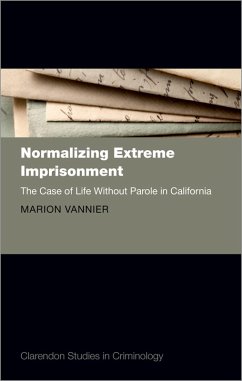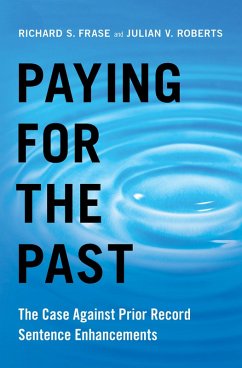
Normalizing Extreme Imprisonment (eBook, ePUB)
The Case of Life Without Parole in California
Versandkostenfrei!
Sofort per Download lieferbar
38,95 €
inkl. MwSt.
Weitere Ausgaben:

PAYBACK Punkte
19 °P sammeln!
A critical, theoretical, and empirical examination of life imprisonment without the possibility of parole (LWOP) is long overdue. This book presents a unique case study of the 'normalization' of LWOP. More specifically, it explores the ties between LWOP's normalization and death penalty abolitionism, using California as a case study. Drawing on rich empirical research, it brings together relevant literature in criminology, the sociology of punishment, social policy, and sentencing to provide insights into the nature of American penal politics, the role of progressive pressure groups, and the r...
A critical, theoretical, and empirical examination of life imprisonment without the possibility of parole (LWOP) is long overdue. This book presents a unique case study of the 'normalization' of LWOP. More specifically, it explores the ties between LWOP's normalization and death penalty abolitionism, using California as a case study. Drawing on rich empirical research, it brings together relevant literature in criminology, the sociology of punishment, social policy, and sentencing to provide insights into the nature of American penal politics, the role of progressive pressure groups, and the relationship between life imprisonment and capital punishment. This study investigates the extent to which members of civil society who challenge capital punishment (lawyers, non-profit organizations, and lobbyists) have helped normalize LWOP by fostering the belief that it is humane and merciful. The monograph focuses on three domains where anti-death penalty activists have lobbied, campaigned, pled for, and agreed to LWOP; Congress, the political sphere, and courtrooms. For each domain, the book teases out the motivations of the main actors and agencies involved. It analyses the constraints under which they considered themselves to be operating, and the relationship between these motivations and the broad social, legal, and political environment in which they unfolded. Particular attention is paid to actors' understandings of the concepts of 'life' and 'death' in punishment. This is an open access title available under the terms of a CC BY-NC-ND 4.0 International licence. It is free to read on the Oxford Academic platform and offered as a free PDF download from OUP and selected open access locations.
Dieser Download kann aus rechtlichen Gründen nur mit Rechnungsadresse in A, B, BG, CY, CZ, D, DK, EW, E, FIN, F, GR, HR, H, IRL, I, LT, L, LR, M, NL, PL, P, R, S, SLO, SK ausgeliefert werden.













